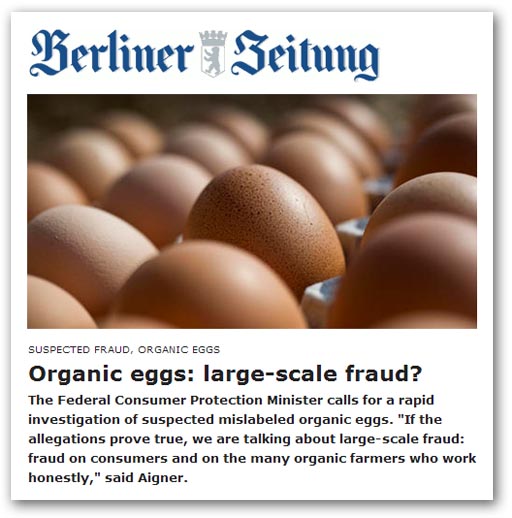The hare has been set running by the Arbeitsgemeinschaft bäuerliche Landwirtschaft, reflecting the German genius for making even a benign producer group sound like a paramilitary organisation. This is the Small Farmers' Association (AbL) who are complaining of a "giant fraud", with large egg packers sending their supermarket customers the right packaging, without too much concern about what is inside it.
Also being criticised are the "lax EU organic standards", pointing once again to the situation where the EU has exclusive competence in dictating the standards for this fabulous Single Market about which Mr Cameron is so enthusiastic.
Handelsblatt takes it further, reporting that the "deliberate deception" of consumers is probably "widespread practice", with millions of eggs involved. It also seems to have got the point. The second major labelling swindle after the horsemeat scandal, it says, "casts doubt on the success of food inspections".
Says Federal Consumer Minister Ilse Aigner (CSU), "It's all about checks and here I have to clearly say that the controls for which the countries are indeed responsible have to be carried not just from your desks. One must, of course, be on the ground, looking at the plants".
Oldenburg prosecutor Roland Herrmann agrees that fraud involving the keeping of chickens and eggs is widespread. His authority is investigating some 100 farms in Lower Saxony.
Profits from illegal substitution are, as one might expect, enormous. As a guide from the UK, Tesco sells a half-dozen "everyday value" eggs for £0.95, compared with £1.70 for free-range and £2.15 for a half-dozen organic eggs. Given that these eggs are chemically indistinguishable – and there is no known test that can identify substitution – the temptation is massive.
And while this "scandal" is at the moment confined to Germany, anyone who thinks it doesn't happen here is in the land of the fayries.
Outside one of the largest, prestige egg packers in the country, I've personally seen anonymous shipping containers, stacked full of eggs, unknown to the egg inspector, which are brought out to make up for shortfalls on any one line – irrespective of type. This has been going on for years.
Egg marketing in Europe is a truly international business, as the consumption cycles in each Member State are slightly different, while egg laying is a constant. You can't switch laying hens on and off like a light switch.
Thus, there is free trade between producers and wholesalers in different countries, to balance supply and demand. With no cross-border checks, there is ample room for fraud and substitution, and precious little policing. Because the egg regulations are of EU origin, and highly complex, Defra runs its own egg inspectorate, too few in number (and lacking the skills) to be able to detect structured fraud.
Once again, though, we confront the same problem. Where the value of a product depends not on its intrinsic characteristics but on the paperwork accompanying it, there will always be scope for fraud. And, when the system is governed by Brussels, and the checks are determined by the European Commission, the fraudsters are always going to have an easy time of it.
That, though, has ministers from 27 Member States in Brussels today discussing more and better labelling for meat products.
Without the first idea of whether they can be enforced, or how, they labour under the illusion that their regulations will actually achieve anything, other than create more and better opportunities for fraud. These people, with the European Commission alongside them, are oblivious to the reality of the world outside their little bubble.
COMMENT: "HORSEMEAT" THREAD
